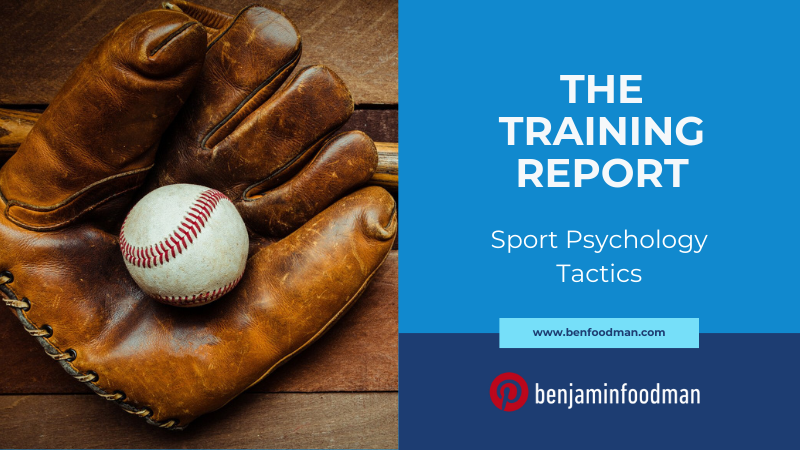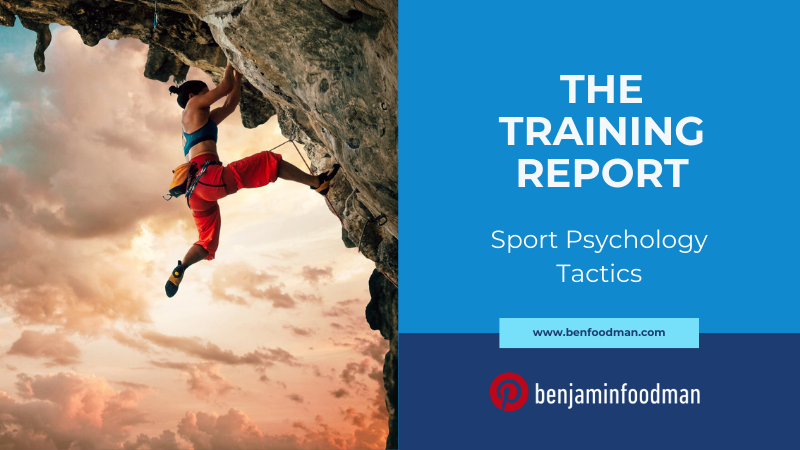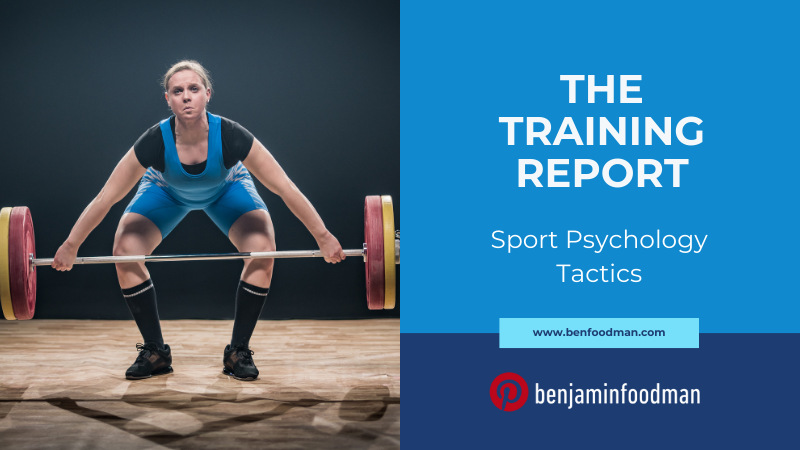Sport Psychology Case Studies - Why Elite Athletes Need Sport Psychologists
About the Author
Ben Foodman is a licensed psychotherapist & performance specialist. He owns his private practice located in Charlotte North Carolina where he specializes in working with athletes to help them overcome mental blocks (the yips), PTSD, ADD / ADHD and achieve flow states through the techniques of Brainspotting & Neurofeedback. If you are interested in services, use the link here! Enjoy the article below!

Table Of Contents
Introduction: The Argument For Athlete Mental Skills Training
Part I. The Mental & Emotional Demands In Competitive Sports
Part II. The Common Psychological Effects Of Competitive Sports On Athletes
Part III. How Sport Psychologists Help Athletes Sustain Mental Endurance
Part IV. The Benefits All Athletes Can Experience With A Sport Psychologist
Introduction: The Argument For Athlete Mental Skills Training
I have been fortunate to work with so many amazing people that compete at all levels of sports. As much as I hope that I have helped athletes improve their mental performance, they have taught me just as much about the journey of being a competitive athlete. I have seen unbelievable moments of triumph and incredible displays of mental toughness that would be inspiring for anyone to witness. However, I have also seen the ugly side of sports and how cruel this industry can be to coaches, athletes and parents alike. To be blunt, some of the most important lessons I have learned have been through my work with athletes that have suffered from the unfair aspects of competitive sports.
As such, I have developed a base of knowledge that has been sharpened by these experiences and has allowed me to more effectively help athletes navigate these potential complexities. Interestingly, I am still introduced to athletes that are not convinced of the need to work with a sport psychologist or mental performance coach because these athletes “want to do it myself”. At the same time, athletes would not reject help from a strength & conditioning specialist to help them physically train for their sport. For this issue of the Training Report, I am going to explore why athletes that want to reach their peak potential need a sport psychologist or mental performance coach to achieve their goals.

Part I. The Mental & Emotional Demands In Competitive Sports
While I have worked with many veteran athletes competing at all levels of sports, many of the client prospects that reach out to me are individuals that are aspiring to compete at the collegiate, Olympic & professional level of sports. Oftentimes, there is a serious lack of understanding as to how difficult and unfair competition can be at the next level. This is in large part due to the fact that many of these individuals and their families are unfamiliar with how team operations work in professional and collegiate sport organizations, as well as the business aspect of this level of competition. The reason this is important to understand is because many up-and-coming athletes will be seriously psychologically and emotionally tested at the next level due to these external pressures, and as such can experience a variety of negative symptoms that will impact their bottom-line performance if left unchecked.
Many of the athletes I have worked with that compete at the professional and collegiate level experience the following symptoms from performance pressure: the yips or unexplained mental blocks, increased stress responses which create abnormal muscle tension, increased injury or low rates of recovery, increase in social isolation, increased likelihood of transferring to another school or earlier than anticipated exit from sport, overtraining syndrome, anxiety, depression, alcohol/substance use, and even post-traumatic stress disorder. Many athletes going to compete at this level do not usually believe they will be the “type of athlete” that would experience the previously mentioned issues, but by the time these symptoms occur they will need extensive help to recover due to this oversight. Whether athletes accept it or not, participation in competitive sports for most people will be a traumatic experience with long-term consequences and as such will require CONTINUED SUPPORT throughout their time training.

Part II. The Common Psychological Effects Of Competitive Sports On Athletes
Another reason athletes underestimate the psychological impact that sports will have on their health is due to the lack of neuroscience training that most sport psychologists and coaches are missing. One of the most important things to understand about ALL competitive sports is that they are all stress tests. In order for athletes in any sport to successfully pass the stress test, they need to be able to give full body focus and full mental focus. However, if any part of their body and or mind has an unresolved issue, the body will start creating error signals and move faster towards regression states. Essentially athletes start exhibiting trauma responses over the course of their career. If left unchecked, these trauma responses will only increase and lead to either an early or forced exit from their sport.
Many universities and professional sports organizations are recognizing this, and as such are hiring a sport psychologist or Certified Mental Performance Consultant (CMPC) on staff to help their athletes navigate the mental and emotional hurdles that comes with sports. Unfortunately, what is not often communicated to athletes is that they will need ongoing support as they are going through their journey in their career. Even worse, the field of sport psychology promotes short-term interventions that are meant to get the athlete “back on their feet”, as if they will arrive at a permanent mental state and become psychologically bullet proof. But as I have discussed extensively in previous Training Reports, the environment of sports will always induce stress tests on athletes which will inevitably have an impact on their central nervous system and mental health functioning.

Part III. How Sport Psychologists Help Athletes Sustain Mental Endurance
When looking at the most effective mental training interventions that sport psychologists and mental performance coaches use, Brainspotting and EMDR (Eye Movement Desensitization & Reprocessing) are amongst the most efficient. When exploring how Brainspotting is used, Brainspotting utilizes the athlete’s field of vision to identify unresolved psychological issues such as the Yips or mental blocks. Through this process athletes have the ability to access the parts of their brain that traditional mental skills approaches can’t. Because almost half of the brain is dedicated to vision, the combined use of eye movement with focused mindfulness helps engage the regions of the brain that are responsible for regulation and bypasses the regions that are not! This results in athletes being able to directly address the true ‘underlying’ issue, which we refer to as a Brain spot. Because Brainspotting is still a relatively new technique, it is not considered an evidence-informed intervention. However, when one studies the neuroscience mechanisms behind this technique and how it helps with stress reduction, it becomes easy to understand why this form of mental training is an effective approach.
In the book This Is Your Brain On Sports by David Grand, the author goes into great detail to explain the neuroscience behind the sports-related stress and how the brain responds to stress events, which therefore makes Brainspotting (and EMDR) a preferred form of mental training. The author describes as follows ‘In parallel fashion, the brain attempts to always move toward a state of psychological equilibrium. Over the course of our lives, we are exposed to a variety of life experiences, some positive, some neutral, and some negative. Through a natural assimilation process, the brain adaptively processes these experiences, so they are constructively integrated. What is useful from the experience is learned and stored in the brain with the appropriate emotion and is available for future use. When an experience is successfully assimilated or digested it is stored in the brain with little attached intense emotion or physical sensation. When we recall such an incident, we don’t reexperience the old emotion or sensation with it. In this way we are informed by our past experiences and memories but not controlled by them and with sports our present athletic performances are not burdened by emotional or physical baggage from the past, only learned experience. By contrast, trauma or any strongly negatively charged experience isn’t adequately assimilated or processed. Instead, the upsetting incident remains stuck in the system in broken pieces’.

Part IV. The Benefits All Athletes Can Experience With A Sport Psychologist
In conclusion, because sports are always stress-inducing experiences, athletes will need to regularly engage in mental training the same way they regularly interact with athletic trainers or strength coaches. Furthermore, athletes need to make sure that the mental training they use with sport psychologists is rooted in evidence-informed neuroscience, is trauma-informed and focused on somatic approaches such as mindfulness/mediation. Athletes recognize that their body will need constant maintenance as they train to compete in sports, and by extension will need to adopt a 21st century perspective and treat their mind the same way as their body. If you are an athlete looking to learn more about mental training or are looking for services, check out more details about how I work with athletes and what types of solutions I use to help them mentally train to be in peak competition form.

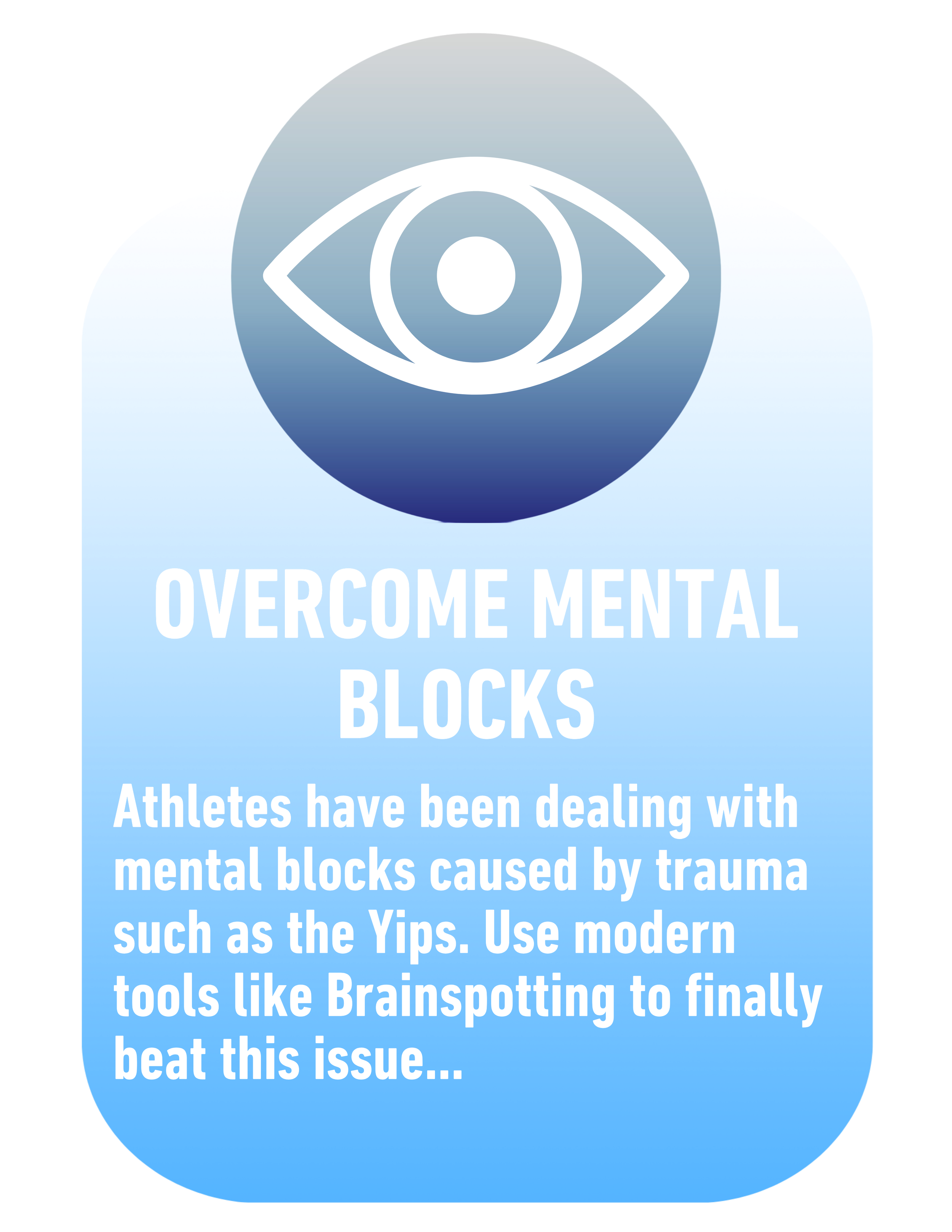
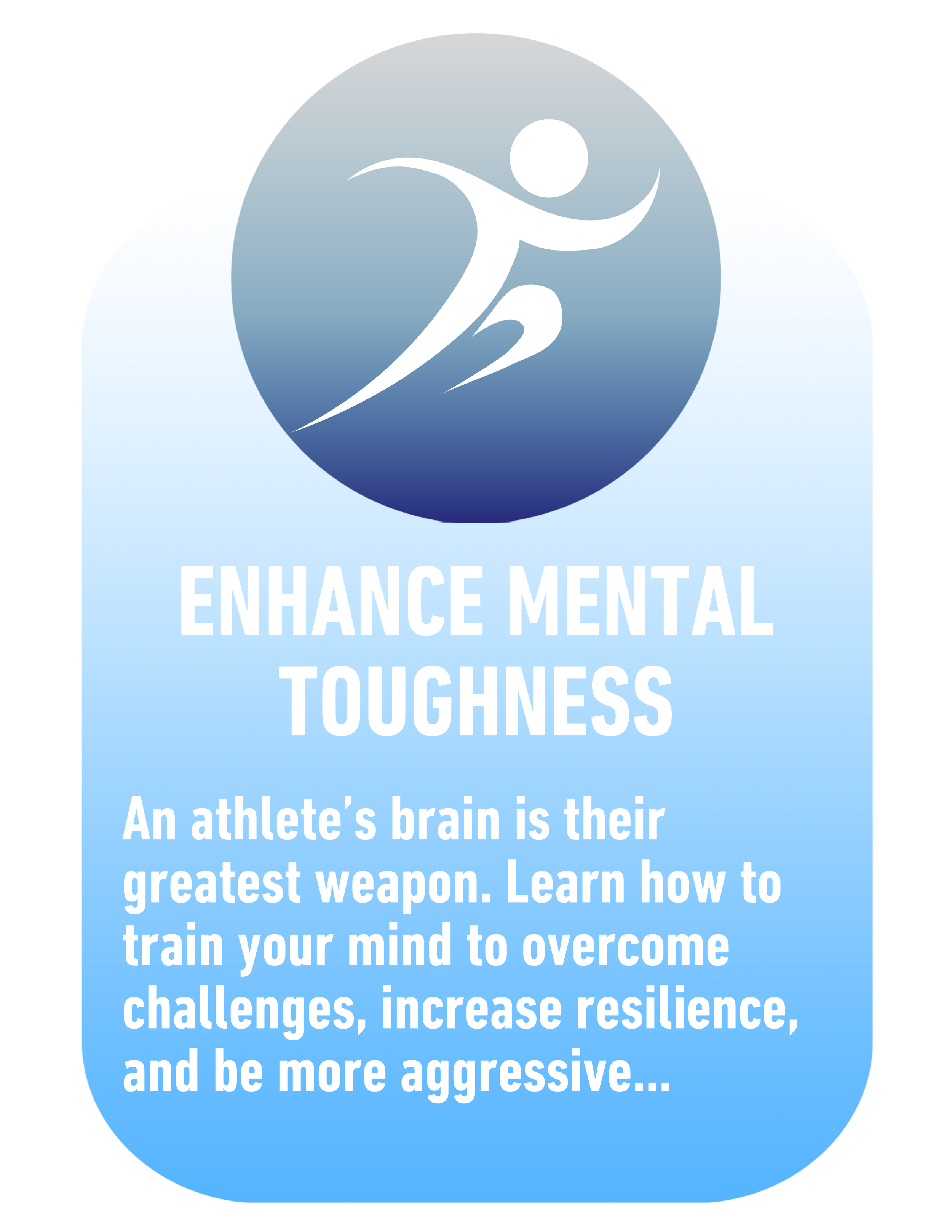
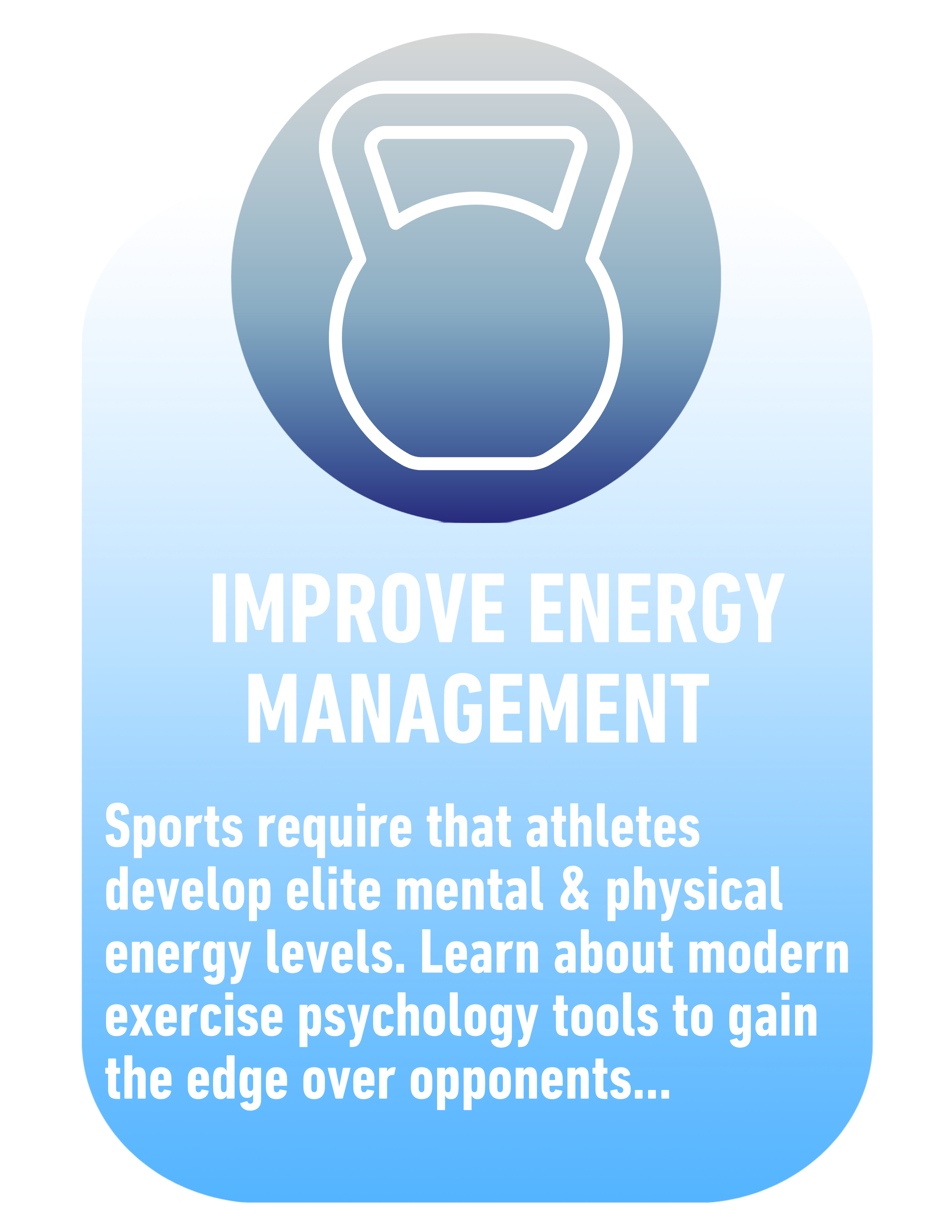





USE THE CONTACT FORM BELOW TO LEARN MORE ABOUT SERVICES!
Note To Reader:
If you are an athlete reading this segment of the TRAINING REPORT, hopefully this content was helpful! I put the Training Report together because I felt like many of the discussions on issues such as the Yips/mental blocks, strength training & other subject matter on athlete performance concepts were really missing the mark on these ideas (e.g. how trauma is the direct cause of the Yips). If you are interested in learning more, make sure to subscribe below for when I put out new content on issues related to sport psychology & athlete performance! Also, if you are looking to work with a mental performance specialist, you are in the right place! USE THIS LINK to reach out to me to see if my services are the right fit for your goals!
ARE YOU ON THE LIST?
Make sure you’re signed up to Ben’s mailing list to receive news & updates on new strategies in sport psychology, upcoming workshops & products. Don’t wait, sign up now!
Check Out The Previous Training Reports!
Racecar drivers competing in IndyCar, Rally, and NASCAR cup series will work with exercise physiologists and sport psychologists to improve their performance. One important part of their training involves developing an aggression mindset and overcoming whiplash syndrome. For this issue of the Training Report I want to review how I have helped drivers accomplish this...
Sport psychologists & mental performance consultants are constantly looking for new interventions to help athletes improve their mental performance. For this Training Report I am going to explore how Neurofeedback can help athletes create flow states…
Athletes, coaches & sport psychologists are constantly looking for ways to speed up recovery & increase performance outcomes. For this Training Report I want to review how Sensory Deprivation Tanks can help elite performers achieve those goals…
Combat sport athletes may be involved in one of the most grueling forms of competition. There is no question that these types of repetitive stress tests can shorten a combat-sport athlete’s career. For this Training Report I want to discuss approaches these performers can use to enhance their career longevity…
Back in January of 2020, I was afforded a rare opportunity to observe flight operations aboard the USS Nimitz. This was an invaluable experience to be able to watch some of the world’s most elite tactical athletes prepare for their ‘sport’. For this issue of the Training Report, I want to discuss the sport psychology lesson on being process focused and how I saw this on my trip…
In my work with athletes, a common issue that arises is that athletes have trouble understanding why they perform so well in practice, but cannot get those same psychological skills to translate towards competition. We will explore these concepts in this issue of the Training Report…
When athletes go to work with sport psychologists, often times they are looking for ways to deal with anxiety in sports. For this Training Report I want to discuss why athletes need to address anxiety first before working on mental toughness training…
When athletes come to work with me, they are usually seeking my services to either overcome a mental block or find unique ways to enhance their psychological performance. For this Training Report, I wanted to provide information on imagery, and how this simple approach can yield powerful results…
When athletes study the traits of their successful counterparts within their field of performance, they are doing so with the hopes of replicating their success. For this Training Report I want to take the time to explore psychological characteristics of elite golf athletes…
Ice Baths are becoming a popular sport psychology tactic for athletes. For this Training Report I am going to review the science behind ice baths for athletes and why this type of process can help athletes improve their mental performance through body recovery…
NASCAR drivers have psychological features that are required to be successful in their sport. But there are also mental characteristics that have universal application. For this Training Report I am going to discuss what those features are and how they can create mental flow states…
Many golfers experience mental blocks during competition and performance. There is still a lot of misinformation on this topic and how golfers can fix this issue. For this Training Report, I want to explore how golfers can efficiently work through mental blocks (aka the yips) and create flow states…
When athletes experience sport-related injuries, they are often shuttled through an entire industry that is exclusively focused on providing only physical rehabilitation services with no consideration for the psychological impact on elite performers. For today’s Training Report I want to review the neuroscience behind sport injuries, the interplay between the mind and body, and how Brainspotting can effectively treat these issues…
When athletes consult with sport psychologists and mental performance consultants, they are usually encouraged to use mainstream sport psychology approaches such as imagery, deep breathing, goal setting, etc. While these approaches can be very helpful for some individuals, there are still a plethora of techniques available that are underutilized. I recently wrote about a new technique where athletes can use their eyes to beat mental blocks…
I have found in my work with elite athletes that one area where athletes need to significantly improve in skill development is through energy management capabilities. For this Training Report I want to discuss why athletes need to invest more time into developing their energy management skills and how they can do this through different strategies such as coffee naps…
Traditional sport psychology approaches such as cognitive behavioral therapy & motivational interviewing are incredibly outdated when we consider the new resources that are available within the sport psychology space. For this Training Report I will cover one of these new resources which is called Neurofeedback. This technique incorporates the use of unique computer hardware-software applications that can measure brainwave activity…
Whether I am working with musicians in Nashville, or other artists within the field of music performance, one of the most common issues that I am sought after is how to help these types of artists deal with mental blocks. For this Training Report I want to discuss the neuroscience of mental blocks for musicians and common mental blocks that are experienced within the musical performance population…
Sport psychologists, mental performance specialists & other experts within the field of human performance have begun to utilize bilateral stimulation to help athletes achieve peak psychological performance. For this Training report, I am going to discuss one form of bilateral stimulation which is known as 8D audio, and explore how elite performers can benefit from using this tool…
Through my work with endurance athletes, I have seen firsthand what has helped them succeed at the highest level of their craft. Interestingly, when working specifically with this population I’ve noticed that there are very distinct yet common mental characteristics that these individuals utilize to help them achieve their level of success. I recently wrote about these athlete traits for Tailwind Nutrition…
An elite level athlete preparing to compete at the Olympics recognizes that they need to be just as committed to training their mind as their body. For this edition of the Training Report, we will discuss sport psychology tactics that Olympians & Paralympians frequently use to enhance their psychological performance during training and sport competition.
One area I believe cycling athletes should focus their mental training on is overcoming mental blocks. Through my work as a performance coach and psychotherapist, this is the most common issue athletes seek consultation for and is arguably one of the most complex problems to work through within the field of sport psychology. For this Training Report I will focus on strategies that can help cycling athletes train through this issue…
Elite performers and athletes recognize that sleep is a vital part of their performance, but may not necessarily understand ‘the why’ or how sleep quality can have such a significant impact on their performance. For this Training Report, I want to focus on exploring the science of sleep, why sleep is so important for elite performers and athletes, and how to develop a routine to potentially enhance your sleep performance…
In Baseball, many pitchers are referred to sport psychologists because they are often susceptible to what is known as The Yips. The Yips is a psychological phenomena where baseball players randomly lose their ability to execute standard sport performance movements despite being physically healthy. For this Training Report I will review the neuropsychology behind the Yips & promising treatment interventions that have shown to be highly effective…
Understanding why you chose to be involved with your given sport will help you get through the rough patches in competition. When things become overwhelming it can be easy to forget these foundational reasons and before you know it, you may not even be sure why you are continuing to grind through the hard work. I recently discussed this in an article I wrote for Tailwind Nutrition.
Top performers enter flow states at will, not by accident. Unfortunately, I find that many athletes are under the impression that it is a matter of luck being able to experience a ‘flow state’. Fortunately, there are many techniques within the field of sport psychology that can help athletes enhance their access to this state of mind. I recently wrote an article for Training Peaks discussing how a certain type of deep breathing can actually slow down an ‘over-active’ mind during high pressure situations.
Many people have the misconception that a one rep max only requires brute strength. Experience has taught me that successfully completing a one rep max is a process that involves precision and focus. I recently wrote an article for Volt Athletics exploring how athletes can use imagery to help enhance their experience and performance during a one rep max.
The field of sport psychology has developed many cutting edge techniques that have been used to help athletes overcome psychological issues during sport performance. Biofeedback, Cognitive Behavioral Therapy, & recovery monitoring devices such as WHOOP have helped athletes improve sport performance. However, Brainspotting is a new clinical intervention that is getting ready to take the sport psychology field by storm…
When athletes and coaches begin planning for how they will train over the course of the year, they use a variety of different strategies. One thing that is usually absent from designing training programs is how to track psychological health effectively. It is absolutely critical that coaches and experts within the field of sport psychology promote the idea that mental health is directly tied to mental performance…
Staying motivated through rough patches in training is something everyone deals with regardless if you are a collegiate athlete, professional athlete, or just a casual weekend warrior. Sport psychologists and mental performance coaches are constantly on the lookout to find the best techniques and strategies to help their clients maintain and enhance their motivation…
Often times people have the misconception that sport psychologists and mental performance coaches exclusively work with athletes, when in reality many professionals within the field of sport psychology actually work with a variety of performers such as musicians. For this Training Report I am going to discuss how musicians can enhance their creativity through specific Brainspotting interventions…
Combat sports athletes such as UFC fighters and Brazilian jiu-jitsu (BJJ) competitors will work with sport psychologists and mental coaches. One approach these athletes should focus on using is Brainspotting. We will review why MMA athletes should use this type of mental training…
Many athletes work with sport psychologists to overcome the Yips, but are also confused by what the Yips actually are. Some athletes and coaches even wonder if the Yips are real. For this issue of the Training Report I want to review what the Yips are and explore a possible ‘Yips’ cure…
When Baseball players get the Yips, they will often work with sport psychologists to overcome this issues. However there are many unknown factors about the Yips that sport psychologists don’t understand. I want to use this Training Report to review two secrets about the Yips…
When athletes work with sport psychologists, they are oftentimes trying to find a cure or understand what the Yips is. For this issue of the Training Report I want to review the Polyvagal Theory and how this explains what affects the Yips…
When race car drivers work with sport psychologists and athlete mental counselors, it is not uncommon for them to try and overcome the Yips. For this issue of the Training Report I want to review mental training approaches professional race car drivers use to beat driver yips…
When racecar drivers competing in NASCAR, 24 Hours of Le Mans, Formula 1 or other promotions work with sport psychologists, they will focus on using specific tools. For this issue of the Training Report I want to focus on the top 2 motorsport mental training approaches: Brainspotting & Biofeedback…
Baseball players and golfers commonly deal with a mental block called the Yips. But gymnasts and cheerleaders deal with a similar issue called the Twisties. For this issue of the Training Report I want to explain what the Twities actually are and how to work through this issue…
When NASCAR, motorsport & professional racecar drivers work with mental performance therapists, they will use exercise psychology strategies as part of their preparation. For this issue of the Training Report I want to discuss what exercise psychology strategies professional racecar drivers need to be using…
When Cross Country and Track & Field athletes do not have access to Brainspotting, a comparable therapy that can be just as effective is EMDR. For this issue of the Training Report, I want to discuss how EMDR can help athletes overcome trauma and the Yips…
One of the biggest obstacles that athletes have to overcome in sports is coping with high Athlete Identity. For this issue of the Training Report I want to review what athlete identity is, how it negatively affects athletes, and how they can fix this issue…
When golfers go to work with sport psychologists, they are trying to fix what is commonly referred to as the golf yips. For this issue of the Training report I want to explore the neuroscience behind this issue and what golfers can do to fix this problem…
Athletes need advanced recovery methods if they are going to keep up with the competition and obstacles associated with sports. Because Float Tanks are becoming a popular tool that helps athletes with these challenges, I wanted to use this issue of the Training Report to review the science behind float tanks…
Some athletes like NASCAR and Formula 1 drivers will work with sport psychologists to do biofeedback training. While this intervention is used to help athletes increase calm mental states, there are other applications that may be more important for racecar drivers and sport psychologists to consider…
Athletes experience conflict when coaches tell them to be ‘more aggressive’ yet society at large looks down at the behaviors associated with aggression and discourages exploring this emotion. For this issue of the Training Report I want to review how athletes can tap into aggression in ways that are both therapeutic while also enhancing performance…
NASCAR athletes and professional racecar drivers in motor sports experience intense physical, psychological and sociological pressure that can create the Yips. For this issue of the Training Report I want to talk about how the Yips affects drivers and what they can do to overcome this issue and ‘get out of their head’…
Athletes will often seek services from sport psychologists to overcome PTSD and sports trauma. For this issue of the Training Report I want to review what psychological trauma looks like in sports and how sport psychologists can actually help athletes with this issue by using Brainspotting…
Actors, musicians, dancers and other professionals in the performing arts are susceptible to a common issue that also plagues athletes: mental blocks (AKA The Yips). For this issue of the Training Report I want to review how mental blocks affect this performance population…
Olympic-style weightlifting athletes will occasionally experience mental blocks commonly known as the Yips. For this issue of the Training Report I want to review what the Yips looks like in Olympic Weightlifting and what can be done to solve this issue…
When athletes go to work with sport psychologists, sometime they will try to address issues such as burnout or the Yips. However it can be difficult to tell the difference. This Training Report will explore the difference between the two and what athletes can do…
When golfers experience the Yips (AKA mental blocks), they will seek the services of AASP CMPCs and sport psychologists. However, many of these athletes are beginning to discover the power of Brainspotting and how it can help with the Yips…
When Major League Baseball players work with sport psychologists they are usually trying to clear mental blocks. Recently, there has been a increasing interest amongst these athletes at using Brainspotting to help players deal with mental blocks (AKA the Yips)…
Equestrian athletes face many psychological challenges in different events such as hunter jumper or dressage. Once common psychological issues these athletes face are mental blocks (e.g. flight, fight, freeze). This Training Report explores what mental blocks are and how Brainspotting can help clear this issue…
NASCAR Drivers are sometimes susceptible towards experiencing mental blocks that can affect confidence and performance outcomes. For this Training Report I want to review how these performers can use Brainspotting to clear this issue…
When athletes work with sport psychologists, they are usually trying to address mental blocks. However, athletes have begun to use sport psychology tactics such as Expansion Brainspotting to help create more flow states during more sport performances…
Both sports and combat environment share the same qualities of a stress-test. Because this is the case there are many sport psychology strategies that tactical athletes can use to offset the negative outcomes of autonomic nervous system dysregulation…
Athletes are looking for cutting edge interventions to help them alleviate the symptoms of mental blocks. I want to use this Training Report to review one such intervention called Brainspotting and how this approach enhances sport performance outcomes…
NASCAR Drivers frequently work with sport psychologists & Certified Mental Performance Consultants to enhance their mental performance. For this Training Report I want to talk about one of the mental skills that NASCAR drivers frequently use to train their minds…
Most sport psychologists try to help athletes learn how to be calm. But there are many times during sports when athletes need to learn how to be aggressive. For this issue of the Training Report, I want to explore why, when and how athletes should train to be aggressive…
When athletes compete and train, they are constantly putting their bodies through repeated stress tests which can train their autonomic nervous system to remain in a higher anxiety state. I was recently afforded the opportunity to write about this for Unyte ILS…
One area of sport-related injuries that needs to be explored more are concussions and how wide spread this issue is across all sports. For this Training Report I want to discuss how concussions work and how Neurofeedback can be a potentially useful intervention for this problem…
When sport psychologists work with professional motorsport athletes, they will typically be tasked with helping these drivers increase aggression and focus. Check out this issue of the Training Report to learn more about effective strategies sport psychologists use when working with racecar drivers competing in events such as the NASCAR cup series or 24 Hours of Le Mans…
Bilateral Stimulation is foundational component of elite sport psychology interventions such as Eye Movement Desensitization & Reprocessing (EMDR) and Brainspotting. Check out this article I wrote for Dharma Dr. on how Bilateral Stimulation technology can help elite athletes improve their mental performance…
When providing mental skills training to elite athletes, I have a specific set of tools I encourage all individuals to use as part of their pre-performance routine. Check out this article to see which tools and resources I ask all of my athletes to use as part of their psychological training and preparation…
One of the most common issues that I run into is when racecar drivers competing in the NASCAR cup series, Xfinity, trucks and WeatherTech Sportscar Championship are trying to find ways to overcome the pressure of qualifying to win pole position. For this issue of the Training Report, I will explore rookie mental tools that have helped many drivers become comfortable with the discomfort of performance pressure during qualifying and also introduce an advanced trick…
NASCAR drivers are some of the most elite motorsport athletes on the planet. But World Rally Championship (WRC) and Rallycross drivers compete in arguably the most mentally challenging motorsport environment and could easily compete in any NASCAR series with the proper training. Learn more about why many of the top sport psychologists view WRC and Rallycross as the most mentally challenging motorsport…
Athletes are using fitness technology such as Garmin watches, WHOOP straps, COROS & Oura rings to not only track their physical activity, but also their mental performance. For this issue of the Training Report, I am going to review how sport psychologists are helping athletes use their wearable data to sharpen their mental training…
One of the most desirable psychological traits that athletes want is mental toughness. Learn more about how sport psychologists are using Brainspotting as a mental skills training tool to help athletes improve this aspect of their mind…
Professional racecar drivers are starting to use sport psychology to enhance their overall performance and increase their mental toughness. For this issue of the Training Report we will review some of the new sport psychology interventions motorsport athletes use to accomplish this…
Racecar drivers are beginning to work with sport psychologists to enhance their mental performance. However, there are many sport psychologists that still use ‘old school’ mental skills training. For this issue of the Training Report, I want to review the new, cutting edge mental skills training approaches that elite racecar drivers are using…
There are many athletes and coaches that try to find ways to improve mental toughness but don’t know how to train this part of the athlete’s mind. For this issue of the Training Report I want to review what mental toughness is and how to train it…
Athletes competing in NASCAR, IndyCar and other motorsports use different methods to enhance their focus. But WRC Rally drivers need to employ the most cutting edge sport psychology tactics. We will review some of those strategies in this issue...
When athletes use mental skills training, they will look for the top sport psychologists who use the best tools. Two of the top sport psychology tools are EMDR (Eye Movement Desensitization & Reprocessing) & Brainspotting. I want to review why athletes should use EMDR and Brainspotting...
IndyCar racing is one of the most challenging motorsports series for drivers to compete in. Because the performance demands are so intense, IndyCar drivers need to regularly engage in smart mental training strategies to stay ahead of the competition. For this issue of the Training Report I want to review what those strategies are...
Baseball players are frequently trying to find ways to beat the Yips cycle and throw freely again. For this issue of the Training Report I want to discuss what the baseball yips are and how athletes can overcome this mental obstacle…
When softball players are unable to perform at their expected capabilities, they are often worried they have the Yips. Because this is such a common issue amongst softball athletes I wanted to take the time to review what softball yips are and how to fix them…
When gymnastics athletes start to freeze before performances or are unable to perform even simple movements, this issue is labeled the Twisties. For this issue of the Training Report I want to review the psychological phenomenon of what the Twisties actually are…
Many golfers will often ask, what are the yips? Experts will say it’s not in your head and will provide techniques to get rid of the yips in your golf game. However the Yips is a much more complicated issue than it may seem which is why I want to review what the Yips actually are…
When auto racers want to enhance their mental training, they will often times work with a sport psychologist or an AASP CMPC. For this issue of the Training Report I want to discuss common mental training strategies racecar drivers use to enhance performance and beat the Yips…
LCSW, Performance Consultant

























